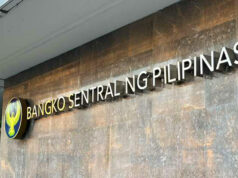November FDI flows sustain rally
By Luz Wendy T. Noble
FOREIGN DIRECT INVESTMENTS (FDI) continued to recover for the second straight month in November after months of drought, though still down during the 11-month period from a year earlier, according to the Philippine central bank.
FDI net inflows in November rose 14.6% to $623 million from a year earlier, data released by the Bangko Sentral ng Pilipinas on Tuesday showed.
Net FDI flows had declined for seven months through September.
However, November inflows fell by 7.29% from $672 million in October.
“Concerns over the global economic outlook continued to curb FDI as investor confidence remained muted,” the central bank said in a statement.
BSP traced the November net inflow pickup to the growth in all FDI components.
Net investments in debt instruments consisting mainly of intercompany borrowing and lending between foreign direct investors and their units in the Philippines posted net inflows of $380 million from $341 million in November last year, BSP said.
In November, equity other than reinvested earnings climbed by 12.9% to $155 million from the previous year. This was after gross placements grew by 17% to $174 million, while withdrawals jumped by 66% to $19 million, data showed.
“The bulk of equity capital placements were sourced mainly from the United States, Thailand, Japan, and South Korea,” the central bank said.
These investments were channeled mostly to the financial, insurance and real estate industries, it said.
Meanwhile, reinvestment of earnings grew by more than a third to $88 million from a year earlier.
UnionBank of the Philippines, Inc. Chief Economist Ruben Carlo O. Asuncion said FDI growth could have come from improved market sentiments about the US-China trade deal.
“Note that the talk of a ‘phase 1’ trade deal between the US and China began in October 2019 which was later on signed in January 2020,” he said in an e-mailed reply to questions.
US President Donald J. Trump in October outlined the coverage of the first phase of their trade deal which China, which covered Chinese agricultural purchases from the US and some aspects of intellectual property protections.
“It is significant that the potential of a trade deal between the two biggest world economies began in October and most likely affecting the general atmosphere of global trade including world markets,” Mr. Asuncion said.
Robert Dan J. Roces, chief economist at Security Bank Corp., attributed the FDI inflow increase to local developments.
“FDI November print validates the growth figures we got for the fourth quarter of 2019, where FDI may be associated with improved growth on the back of capital influx, better tax revenues and steady employment growth,” he said in an e-mail.
Foreign direct investments were still down by 29.9% to $6.413 billion in the 11 months through November from a year earlier, data showed.
Equity other than reinvested earnings during the 11 months fell by almost two-thirds to $845 million.
This came on the back of a 41.3% drop in placements to $1.493 billion, while withdrawals surged by 59% to $648 million from the previous year.
BSP said equity capital placements during the 11-month period mostly came from Japan, US, Singapore, China and South Korea.
“These capital infusions were invested primarily in the financial and insurance, real estate, and manufacturing industries,” it said.
Meanwhile, reinvested earnings grew by 14.4% to $913 million from a year earlier.
However, January to November FDI in debt instruments fell by a quarter to $4.655 billion from the previous year.
2019 GOAL
The BSP had targeted $6.8 billion worth of FDIs last year.
UnionBank’s Mr. Asuncion said the goal could have been achieved amid “improved global trade prospects.”
Victor A. Abola, a professor at the University of Asia and the Pacific, said the target was within reach because “it’s only about $400 million short, which is not going to be a problem.”
But Mr. Abola said the almost 30% year-to-date drop in FDI inflows was “quite sizable.”
“Foreign investors are looking for incentives in the Philippines because of our natural deficiencies — high labor and power costs and poor infrastructure,” he said by telephone. “All of those negatives have to be offset by something for us to be competitive.”
Mr. Abola said the 11-month decline reflected the investment environment and pointed to “taxation and regulatory issues” that may have led investors to adopt a wait-and-see attitude.
The Corporate Income Tax and Incentives Rationalization Act, which seeks to gradually cut the corporate income tax to 20% from 30%, is targeted to be passed by March this year. It has been pending in the Senate since October.
A government review of water contracts may have also made investors wary because the sanctity of contracts is important to them, Mr. Abola said.



